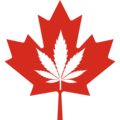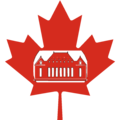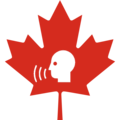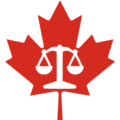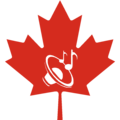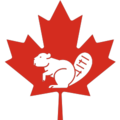Portal:Canada
| Showcase | Contents | Contributing |
Introduction
Canada is a country in North America. Its ten provinces and three territories extend from the Atlantic Ocean to the Pacific Ocean and northward into the Arctic Ocean, making it the world's second-largest country by total area, with the world's longest coastline. Its border with the United States is the world's longest international land border. The country is characterized by a wide range of both meteorologic and geological regions. With a population of just over 41 million people, it has widely varying population densities, with the majority residing in urban areas and large areas of the country being sparsely populated. Canada's capital is Ottawa and its three largest metropolitan areas are Toronto, Montreal, and Vancouver.
A developed country, Canada has a high nominal per capita income globally and its advanced economy ranks among the largest in the world by nominal GDP, relying chiefly upon its abundant natural resources and well-developed international trade networks. Recognized as a middle power, Canada's strong support for multilateralism and internationalism has been closely related to its foreign relations policies of peacekeeping and aid for developing countries. Canada promotes its domestically shared values through participation in multiple international organizations and forums. (Full article...)
Featured article -
Level Mountain is a large volcanic complex in the Northern Interior of British Columbia, Canada. It is located 50 kilometres (31 miles) north-northwest of Telegraph Creek and 60 km (37 mi) west of Dease Lake on the Nahlin Plateau. With a maximum elevation of 2,164 metres (7,100 feet), it is the second-highest of four large complexes in an extensive north–south trending volcanic region. Much of the mountain is gently sloping; when measured from its base, Level Mountain is about 1,100 m (3,600 ft) tall, slightly taller than its neighbour to the northwest, Heart Peaks. The lower, broader half of Level Mountain consists of a shield-like structure whereas its upper half has a more steep, jagged profile. Its broad summit is dominated by the Level Mountain Range, a small mountain range with prominent peaks cut by deep valleys. These valleys serve as a radial drainage for several small streams that flow from the mountain. Meszah Peak is the only named peak in the Level Mountain Range. (Full article...)
Current events
- April 9, 2025 – Tariffs in the second Trump administration, Executive orders in the second presidency of Donald Trump
- Canada announces a 25% tariff on certain vehicle imports from the U.S. as retaliation against a previous similar measure from the U.S. (BBC News)
- April 3, 2025 – Tariffs in the second Trump administration
- Multinational car manufacturer Stellantis announces it will lay off 900 workers across five of its U.S. factories and will pause production at assembly plants in Canada and Mexico in response to the tariffs. (Reuters)
- April 3, 2025 – Canada convoy protests
- The Ontario Court of Justice in Ontario, Canada, convicts Tamara Lich and Chris Barber, two leaders of the truck driver protest movement against COVID-19 vaccination in Canada, of criminal mischief. (AP)
- April 2, 2025 – Tariffs in the second Trump administration
- China–United States trade war, 2025 United States trade war with Canada and Mexico
- Exceptions include Canada, Cuba, Mexico, North Korea, and Russia. Canada and Mexico had tariffs placed on them in February, while Cuba, North Korea, and Russia are under U.S. sanctions. (BBC News) (France 24) (India Today)
- The United States Senate votes 51–48 on a non-binding resolution to rebuke and reverse tariffs on Canada, with Republicans Rand Paul, Susan Collins, Lisa Murkowski, and Mitch McConnell voting for the resolution. (NPR)
Selected panorama -
National symbol -

The Canadian (French: cheval canadien) is a horse breed from Canada. It is a strong, well-muscled horse, usually dark in colour. It is generally used for riding and driving. Descended from draft and light riding horses imported to Canada in the late 1600s from France, it was later crossed with other British and American breeds. During the 18th century the Canadian horse spread throughout the northeastern US, where it contributed to the development of several horse breeds. During the peak popularity of the breed, three subtypes could be distinguished, a draft horse type, a trotting type and a pacing type. Thousands of horses were exported in the 19th century, many of whom were subsequently killed while acting as cavalry horses in the American Civil War. These exports decreased the purebred Canadian population almost to the point of extinction, prompting the formation of a studbook and the passage of a law against further export. (Full article...)
Selected vital article -
Multiculturalism in Canada was officially adopted by the government during the 1970s and 1980s. The Canadian federal government has been described as the instigator of multiculturalism as an ideology because of its public emphasis on the social importance of immigration. The 1960s Royal Commission on Bilingualism and Biculturalism is often referred to as the origin of modern political awareness of multiculturalism, resulting in Canada being one of the most multicultural nations in the world. The official state policy of multiculturalism is often cited as one of Canada's significant accomplishments, and a key distinguishing element of Canadian identity and Canadian values. (Full article...)
Selected picture -
Featured biography -
Harold Adams Innis FRSC (November 5, 1894 – November 8, 1952) was a Canadian professor of political economy at the University of Toronto and the author of seminal works on media, communication theory, and Canadian economic history. He helped develop the staples thesis, which holds that Canada's culture, political history, and economy have been decisively influenced by the exploitation and export of a series of "staples" such as fur, fish, lumber, wheat, mined metals, and coal. The staple thesis dominated economic history in Canada from the 1930s to 1960s, and continues to be a fundamental part of the Canadian political economic tradition. Innis has been referred to as the "father of communications theory" and as the "father of Canadian economic history". (Full article...)
Did you know -

- ... that when the Canadian baritone Iain MacNeal appeared as Odysseus in Dallapiccola's Ulisse at the Oper Frankfurt, a reviewer noted that he portrayed the "character's self-exegeses"?
- ... that Joe Wirkkunen coached the Finland men's national ice hockey team after receiving a recommendation from Canada?
- ... that Theo Benedet is the first offensive lineman to be named the best Canadian university football lineman two years in a row?
- ... that the shores of Kesagami Lake in Kesagami Provincial Park (northern Ontario, Canada) are surrounded by "exceptional" peat cliffs reaching 4 metres (13 ft) in height?
- ... that Canadian professional ice hockey player Larry Jeffrey had eleven knee surgeries in a span of nine years?
- ... that the mainland portion of Lake of the Woods Provincial Park in northwestern Ontario, Canada, was deregulated as part of a First Nations land claim settlement?
- ... that despite not owning a road bike the year before, Nickolas Zukowsky placed third in the 2016 Canadian National Junior Road Race Championships?
Featured list -
Canada's national parks are protected areas under the Canada National Parks Act, owned by the Government of Canada and administered for the benefit, education, and enjoyment of the people of Canada and its future generations. National parks are administered by Parks Canada, a Crown agency operating under the jurisdiction of the Ministry of Environment and Climate Change. The goal of the national parks system is to set aside lands representing the country's 39 distinct natural regions described in the National Parks System Plan, primarily to protect the ecological integrity of the land, and secondarily to allow the public to explore, learn about and enjoy Canada's natural spaces. (Full article...)
Main articles
Associated Wikimedia
The following Wikimedia Foundation sister projects provide more on this subject:
-
Commons
Free media repository -
Wikibooks
Free textbooks and manuals -
Wikidata
Free knowledge base -
Wikinews
Free-content news -
Wikiquote
Collection of quotations -
Wikisource
Free-content library -
Wikiversity
Free learning tools -
Wikivoyage
Free travel guide -
Wiktionary
Dictionary and thesaurus







